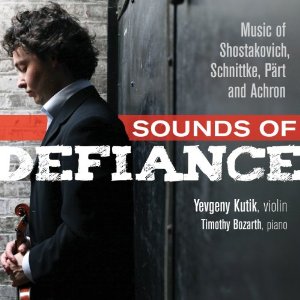Classical CD Review: “Sounds of Defiance” (Yevgeny Kutik, violin/Timothy Bozarth/piano)
This recording heralds a serious, probing musician exploring some vital, if unfamiliar, twentieth-century violin repertoire, and, as such, presents a more-than-welcome addition to recent solo violin discography.
Sounds of Defiance. Yevgeny Kutik, violin, and Timothy Bozarth, piano. Marquis Classics.
By Jonathan Blumhofer
Sounds of Defiance, Russian-American violinist Yevgeny Kutik’s debut album on the Marquis label comes weighted with significance for the young musician. Its focus on music written in the Soviet Union echoes the “profound connection” Mr. Kutik writes that he feels with that nation’s history and culture, while the inclusion of two pieces by Joseph Achron emphasize the violinist’s Jewish heritage.
Accompanied by the excellent pianist Timothy Bozarth, Mr. Kutik pulls no punches here: he has technique to burn, to be sure, but his technique never overshadows his innate musical sensibilities. This recording heralds a serious, probing musician exploring some vital, if unfamiliar, twentieth-century violin repertoire, and, as such, presents a more-than-welcome addition to recent solo violin discography.
The two big pieces on the CD, Alfred Schnittke’s Violin Sonata no. 1 (1963) and Dmitri Shostakovich’s Sonata for Violin and Piano (1968), are given thoroughly characteristic performances. Neither sonata is widely known, though both have been recorded by some fine violinists in the past, including Daniel Hope and Ilya Gringolts (Schnittke), and Joshua Bell and David Oistrakh (Shostakovich). Mr. Kutik’s performances of both pieces hold up with the best of them.
The Schnittke Sonata presents some early examples of the composer’s later technique of “polystylism,” in which contrasting musical styles are layered and juxtaposed, though it is probably the influence of Shostakovich that looms largest on this score. Mr. Kutik is at his most aggressive in the fast second and fourth movements, dramatically emphasizing Schnittke’s dissonant textures, while the third movement allows him to demonstrate his great lyrical capabilities.
The Shostakovich Sonata was written for the incomparable David Oistrakh and falling, as it does, towards the end of Shostakovich’s life, reflects the ambiguous tone of that composer’s last two symphonies and his Viola Sonata. Mr. Kutik has a very strong sense of this music’s brooding character, particularly in its outer movements. Mr. Bozarth proves himself an ideal accompanist, especially in the busy textures of this Sonata, ever present but not overwhelming Mr. Kutik’s playing in this performance truly captures the “violin and piano” quality of Shostakovich’s title.
Filling out the disc are two lovely Joseph Achron compositions, Hebrew Melody (op. 33) and Hebrew Lullaby (op. 35, no. 2), and Arvo Pärt’s Spiegel im Spiegel. The Achron pieces are given expressive, soulful readings, while the gentle Pärt opus provides a benediction of sorts. Mr. Kutik and Mr. Bozarth are at their most sensitive and understated in this latter selection, never rising above a piano dynamic, allowing the score’s slowly unfolding tonal harmonies to function as a balm for the musical turbulence previously experienced. It’s all positively haunting.
Tagged: Achron, Marquis, Part, Schnittke, Shostakovich, Sounds of Defiance, Timothy Bozarth

